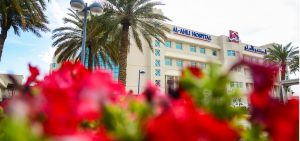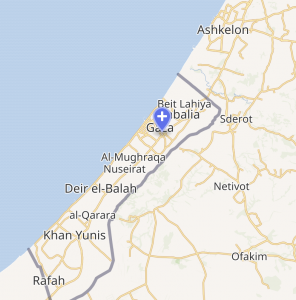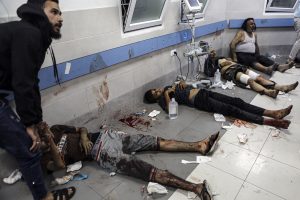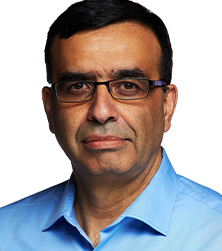The Gaza hospital where at least 500 people died in an Oct. 17 blast once was managed by Southern Baptist Convention missionaries.
Al-Ahli Hospital has been in operation since 1882 and was founded by the Church Mission Society of the Church of England. From 1954 to 1982, it was managed by missionaries affiliated with the SBC Foreign Mission Board, now known as the International Mission Board. Since 1980, the hospital has been run by the Episcopal Church.
The hospital, located in northern Gaza, was sheltering thousands of displaced people when it was bombed Tuesday, the Palestinian Health Ministry said in a statement. An untold number of victims remained buried under the rubble Tuesday night.

Al-Ahli Hospital before the strike
The airstrike appears to have hit the hospital’s courtyard, where many refugees were staying.
This was the second time in four days the hospital has been hit. On Saturday, its Diagnostic Cancer Treatment Center was hit by an Israeli rocket. Ultrasound and mammography wards were severely damaged.
Exactly what happened in Tuesday’s attack is not yet clear. Palestinian officials blamed Israeli airstrikes but the Israel Defense Forces “categorically” denied any involvement, instead blaming a “failed rocket launch” by the Palestinian Islamic Jihad group. The PIJ denied that accusation.
“The Zionist enemy is trying hard to evade its responsibility for the brutal massacre he committed by bombing the Baptist Arab National Hospital in Gaza through his usual fabrication of lies, and through pointing the finger of blame at the Islamic Jihad movement in Palestine,” the PIJ said in a statement.
The American Jewish Committee said mainstream media reports “got it wrong” on what happened at the Gaza hospital. “Israel’s military operations in Gaza are focused and deliberate, only targeting terrorists, their weapons stockpiles and facilities, and their infrastructure. Civilian deaths are tragedies, no matter the location. Civilian casualties are sometimes the result of terror groups’ use of human shields, or civilians ignoring Israeli calls for the evacuation of targeted sites.
 “Hamas stores weapons in residential areas, even schools and hospitals, firing rockets from densely populated areas,” the AJC added. “The Iran-backed group operates command centers in civilian areas, and sometimes uses civilian clothing to blend in. Such practices make it challenging for the Israeli military to target legitimate military assets without risking civilian casualties.”
“Hamas stores weapons in residential areas, even schools and hospitals, firing rockets from densely populated areas,” the AJC added. “The Iran-backed group operates command centers in civilian areas, and sometimes uses civilian clothing to blend in. Such practices make it challenging for the Israeli military to target legitimate military assets without risking civilian casualties.”
Israeli President Isaac Herzog called media accusations that Israel hit the hospital a “blood libel.”
He wrote on X, formerly known as Twitter: “An Islamic Jihad missile has killed many Palestinians at a Gazan hospital — a place where lives should be saved. Shame on the media who swallow the lies of Hamas and Islamic Jihad — broadcasting a 21st-century blood libel around the globe. Shame on the vile terrorists in Gaza who willfully spill the blood of the innocent.”
Regardless of who was responsible, the bombing came as nearly 1 million people — mainly Palestinians — were fleeing northern Gaza ahead of a likely Israeli ground offensive said to be aimed at rooting out Hamas, which attacked Israel Oct. 7.
While Western allies such as the United States and France have stood solidly with Israel, affirming its right to retaliate against Hamas, others around the globe have sharply criticized Israel’s killing of nearly 3,000 Palestinians, including hundreds of children.

Wounded Palestinians lie on the floor in al-Shifa hospital in Gaza City, central Gaza Strip, after arriving from al-Ahli hospital following an explosion there, Tuesday, Oct. 17, 2023. The Hamas-run Health Ministry says an Israeli airstrike caused the explosion that killed hundreds at al-Ahli, but the Israeli military says it was a misfired Palestinian rocket. (AP Photo/Abed Khaled)
The Israeli offensive and blockade have left 22 Gaza hospitals, such as Al-Ahli Baptist Hospital, caring for thousands of wounded without electricity, water, food or medicine. As pain medicines run out, children and adults are left writhing in agony and babies on life support are left to die.
Today’s Southern Baptist leaders are among those declaring Israel is justified in its actions, even as thousands of innocents die. An “Evangelical Statement in Support of Israel” published by the SBC’s Ethics and Religious Liberty Commission mentions Palestinians only in the context of evangelism.
In a previous generation, Southern Baptists did mission work around the world with a heavy dose of social ministry, including hospitals, schools and aid centers. In the 1980s, that approach began to change to a more explicitly evangelistic and church-planting agenda that no longer needed institutions.
A 2013 Baptist Press article explained the transition away from medical institutions, quoting legendary missionary doctor Rebekah Naylor, who served 35 years in Bangalore, India.
“The reasons for the transition were both financial and philosophical,” Naylor said. “Financially, institutions are expensive to maintain. Philosophically, the leadership of the (IMB) believed that institutions were not the best and strongest way to accomplish evangelism and church planting.”
The BP story explains: “Consequently, in the mid-1980s, IMB began handing over control of its more than 30 hospitals and medical and dental clinics to local partners. A 1997 IMB report — the last publication identifying international institutions with Baptist ties — lists 17 hospitals, 10 medical clinics, six dental clinics and one school in places such as Brazil, Indonesia, Japan and Yemen.”
Episcopal News Service reported that within hours of Tuesday’s strike, Anglican and Episcopal leaders issued statements condemning the violence for indiscriminately striking a hospital at a time when Palestinians in Gaza were desperate for a safe haven.
“Initial reports suggest the loss of countless lives, a manifestation of what can only be described as a crime against humanity,” said the Anglican diocese that operates the hospital. “Hospitals, by the tenets of international humanitarian law, are sanctuaries, yet this assault has transgressed those sacred boundaries. … An urgent appeal resonates for the international community to fulfil its duty in protecting civilians and ensuring that such inhumane horrific acts are not replicated.”

Bader Mansour
Bader Mansour, a longtime Baptist leader in Israel, explained how the hospital was part of a larger Baptist mission in the region.
“After the year 1948 and the establishment of state of Israel, the Gaza Strip came under Egyptian control,” he said. “It included 300,000 people, among them 280,000 Palestinian refugees who had lost their homes in the areas that had become Israel. Many of them lived in refugee camps in dire conditions. During this period, the Southern Baptist Foreign Mission Board established a medical mission to serve Palestinian refugees. They established a hospital in Ajloun in the Hashimite Kingdom of Jordan, where a significant number of Palestinian refugees had found shelter. They also adopted another hospital in the city of Gaza.
“The hospital adopted by the Baptists in Gaza was an old hospital founded in 1882 by the British Anglican Church Missionary Society. In 1954, its management was taken over by the Southern Baptists and its name was changed to the Baptist Hospital. In 1982, it was handed over again to the Anglican/Episcopal Church in Jerusalem and the Middle East and was renamed ‘the Arab Ahli Hospital,’ which is its name to this day.”
For the first 10 years of its Baptist operation, the hospital was led by James M. Young, a missionary doctor, Mansour said. “With the Baptist missionaries arriving to serve in the hospital, a Baptist church was also established in the hospital in 1959 under the leadership of missionary Ed Nicolas. In 1962, the church received its first national pastor, Rev. Hanna Ibrahim, an Egyptian born in Samalut, Minya Governorate, Egypt.”
When Israel occupied the West Bank from Jordan and the Gaza Strip from Egypt in June 1967,. the hospital retained American doctors David Dorr and Merrill Moore, along with nurse Marlyn Shaffer, Mansour said. “The Lebanese and Egyptian nurses remained alongside local nurses. The Baptist Hospital in Gaza, which remained open during the war, treated hundreds of injured individuals and performed around 130 surgeries in the first two weeks of the war. The people in Gaza appreciated the efforts of the Baptist medical mission. Additionally, refugees seeking shelter and food would come to the hospital, as it was considered a safe place during the conflict. The church also provided food to more than 500 people each day in that period.”
“The people in Gaza appreciated the efforts of the Baptist medical mission.”
After the occupation of Gaza, the hospital continued to operate, employing American doctors and nurses, along with Palestinian medical staff.
Mansour recounted that on Jan. 16, 1972, American nurse Mavis Pate was killed when a van she was traveling in near the Jabalia refugee camp was caught in clashes between Palestinian Liberation Organization factions and an armed Israeli patrol. “In the incident, the van driver, Rev. Ed Nicolas, and his daughters Joy, Carol Pate and Marian were also injured. The sacrifice of Mavis inspired many American nurses to follow her example in serving in Gaza.”
Baptists returned control of the hospital to the Anglican church on Jan. 1, 1982, Mansour said. “This decision was necessary because the hospital’s annual budget was half a million dollars, and it was required to collect 80% of this amount from the patients. However, this became impossible with the financial inflation reaching 130% in 1981. After the ownership transfer, the hospital still had 17 salaried Baptist missionaries, and the Baptist missionaries managed the nursing school for several years.”
The legacy of the Baptist mission work in Gaza obviously endures to this day, Mansour noted, because many media reports have identified the hospital as “Baptist,” even though that has not been the case for 40 years.
“It seems some in Gaza still remember the old name and the contribution of the Baptists in serving the people of Gaza, which continues to this day through the Baptist Church in Gaza.”


